How to buy screw oil press
Selecting the perfect machine is crucial for your business success. We understand the challenges involved. Let’s break down everything you need to know about screw oil presses, step by step. We want to empower you to make an informed decision.
What is a screw oil press? How is it different from other oil presses?
A screw oil press uses a mechanical screw for continuous oil extraction. This differs from hydraulic presses, which use a piston and work in batches. It also differs from solvent extraction, which uses chemicals.
Let’s look deeper into these differences. A screw press offers continuous operation. This makes it suitable for various production scales. Raw material is fed in one end. Oil and solid cake come out separately. Hydraulic presses use static pressure applied by a hydraulic ram. They typically process material in batches, requiring loading and unloading cycles. Solvent extraction is a chemical process usually used for very large industrial operations to achieve the lowest residual oil content. It involves complex equipment and safety considerations. At Zhengzhou Fude Machinery, we manufacture various types, including single screw presses, double screw presses, and hydraulic presses. We can help you choose based on your material and scale.

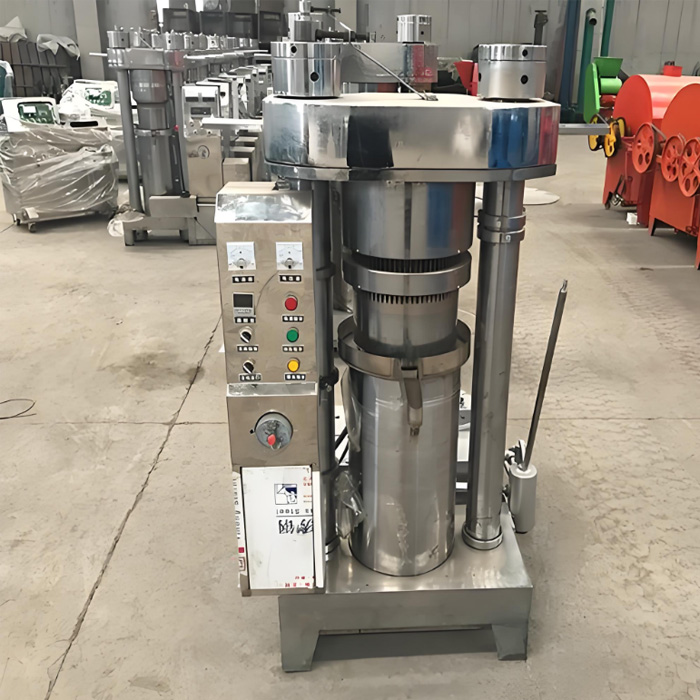
How does a screw oil press squeeze oil out of raw materials?
The screw press uses a specially designed rotating screw inside a barrel. This screw pushes the raw material forward. It gradually increases pressure, crushing the material and breaking oil cells. Oil escapes through barrel openings.
Pressure Build-up in the Barrel
The barrel, or press cage, surrounds the screw. It withstands the high pressure generated. Its design, often using strong steel bars with precise gaps, allows oil to escape while retaining the solid cake. The clearance between the screw and the barrel is also critical for efficient pressing.
Oil Separation and Cake Discharge
As pressure builds, oil flows through the barrel openings and is collected in a tray below. The de-oiled solid residue, the cake, continues along the screw shaft. It exits through an annular gap or adjustable cone at the end. The thickness of this exiting cake can often be adjusted, which helps control the pressure inside the press. This cake is also a valuable byproduct, often used for animal feed.
Cold press and hot press screw oil presses, which is better for my business needs?
Cold pressing yields higher quality oil with natural flavors and nutrients, but less quantity. Hot pressing involves heating the seeds before pressing, increasing oil yield but potentially altering the oil’s characteristics. Your choice depends on your target market and priorities.
Understanding Cold Pressing
This method focuses on preserving the oil’s natural state.
- Pros: High nutritional value, natural flavor and aroma, premium market price.
- Cons: Lower oil yield, potentially shorter shelf life if not stored properly.
- Best for: High-value oils (flaxseed, walnut, virgin olive), health food markets, culinary uses where flavor is key.
Understanding Hot Pressing
This method prioritizes maximizing the amount of oil extracted.
- Pros: Significantly higher oil yield, often longer shelf life, lower residual oil in cake.
- Cons: Can alter flavor, color, and nutrient profile due to heat. Requires pre-heating equipment.
- Best for: Commodity oils (soybean, rapeseed, cottonseed), maximizing volume, situations where yield is the primary driver, industrial uses.

My oilseed (like peanuts, soybeans, rapeseed) – will a screw press work well?
Yes, screw oil presses are very effective for a wide range of common oilseeds. This includes peanuts, soybeans, rapeseed (canola), sunflower seeds, cottonseed, sesame seeds, flaxseed, and many others. Performance varies slightly with seed type.
Screw presses are versatile machines. They are designed to handle the mechanical challenges of extracting oil from diverse materials. Peanuts, with their high oil content, press very well. Soybeans usually require pre-treatment like cracking, dehulling, and conditioning (heating and moisture adjustment) for optimal results in a screw press, especially for higher capacity operations. Rapeseed/Canola presses efficiently due to their oil content and structure. Sunflower seeds, whether dehulled or not, are also commonly processed. The effectiveness depends on factors like the seed’s oil content, moisture level, hardness, and whether pre-treatment steps are applied. We have extensive experience with different oilseeds at Zhengzhou Fude Machinery. We can advise on the best press configuration and any necessary pre-treatment for your specific raw material to ensure good performance and yield.
Common Materials for Screw Pressing
Our screw presses are proven effective for a vast array of oil-bearing materials:
- High Oil Content Seeds: Peanuts, Sunflower Seeds, Sesame Seeds, Rapeseed (Canola), Cottonseed, Coconut (Copra), Palm Kernels.
- Lower Oil Content Seeds: Soybeans (often requires pre-flaking for better results).
- Nuts: Walnuts, Almonds (often requires size reduction).
- Specialty Seeds: Flaxseed, Castor Beans, Jatropha Seeds, Moringa Seeds, Sacha Inchi.
How do I determine if a screw oil press’s processing capacity meets my production requirements?
Are you worried about choosing a press that’s too small for your needs? Or perhaps investing in one that’s unnecessarily large? We can guide you on matching capacity correctly.
Check the manufacturer’s rated processing capacity, usually given in tons of raw material per 24 hours (T/D) or kilograms per hour (kg/h). Compare this to your daily processing target and planned operating hours.
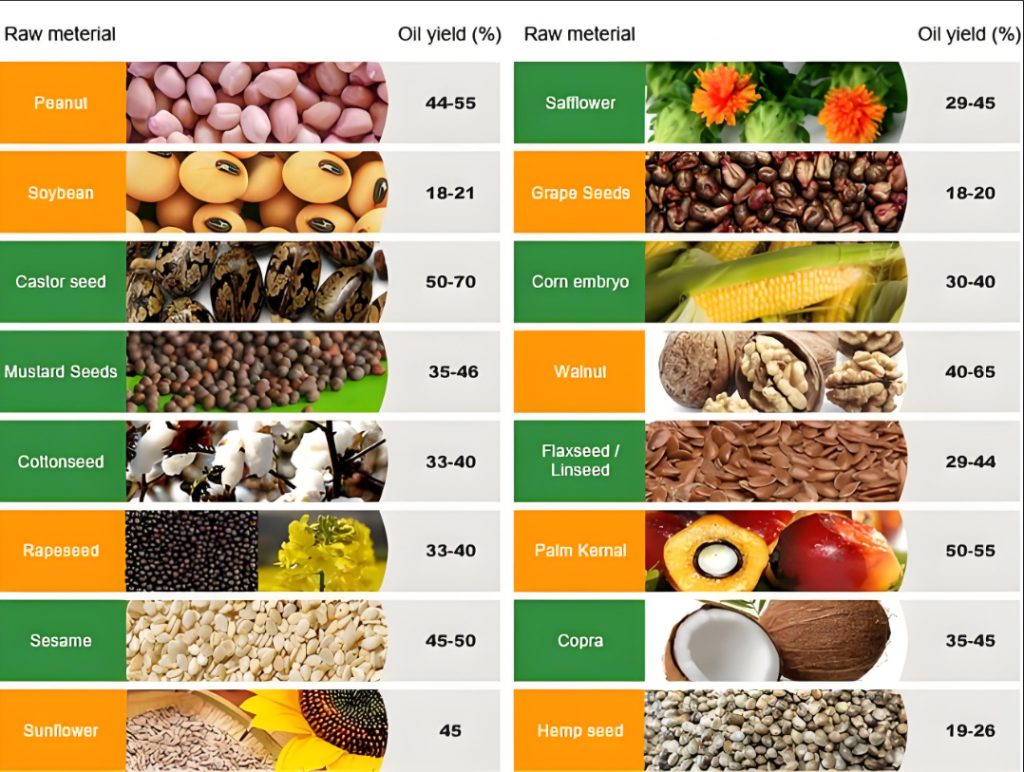
What are the key factors affecting screw oil press yield? How do I choose a high-yield machine?
Key factors influencing oil yield include proper raw material preparation (moisture, temperature, cleanliness), the press’s mechanical design (screw and barrel configuration, pressure capability), and correct operating parameters (speed, cake thickness). Choose presses with optimized designs and ensure good pre-treatment.
Are screw oil presses complicated to operate? What about daily maintenance?
Modern screw oil presses are designed for relatively straightforward operation, often featuring simple controls. Daily maintenance is manageable, mainly involving cleaning, visual inspection, checking lubrication, and ensuring fasteners are tight.
Screw oil press prices vary significantly. Costs depend on factors like processing capacity, machine type (single/double screw, hot/cold), automation level, construction materials, brand reputation, and included services. Smaller units cost less than large industrial lines.
Getting Value for Your Investment
While price is important, focus on the total cost of ownership and return on investment. A slightly more expensive machine with higher yield, better durability, and reliable support might be more profitable in the long run than the cheapest option. Consider factors like energy efficiency, spare part costs, and expected lifespan. As a factory-direct supplier, we strive to provide excellent value by combining quality manufacturing with reasonable pricing.
Conclusion
While price is important, attention should be paid to total cost of ownership and return on investment. A slightly more expensive but more productive machine with better durability and more reliable support may be more profitable in the long run than the cheapest option. Consider factors such as energy efficiency, spare parts costs and life expectancy. As a factory-direct supplier, we strive to provide excellent value by combining quality manufacturing with reasonable pricing. Choosing the right manufacturer is just as important as choosing the right machine. You want a supplier that not only builds quality equipment, but also understands your needs and can support you over the long term. A company with decades of experience like Zhengzhou Fude Machinery (founded in 2005) is a reliable manufacturer who will stand behind its products.
Related recommendations
-
What is the application scope of hydraulic oil press
109Hydraulic oil press is a device specifically designed for extracting various vegetable oils
View details -
Is olive oil cold pressed oil
163Olive oil is directly cold pressed from fresh olive fruit, without heating or chemical treatment, thus preserving its natural nutritional components.
View details -
How much is the price of a small oil press in 2024
403Zhengzhou Fude Machinery integrates production, manufacturing, and sales, with rich experience in the oil press industry, complete equipment, and discounted prices.
View details -
Is organic sunflower seed oil pressed
203Organic sunflower seed oil is usually extracted by pressing method. The pressing method, also known as the "physical pressing method", is to use external force to squeeze out the oil in the oil without using other chemical solvents, thus avoiding ...
View details
 Oil Press Equipment and Oil Refining Machinery for Sale – Start Your Oil Press Business
Oil Press Equipment and Oil Refining Machinery for Sale – Start Your Oil Press Business
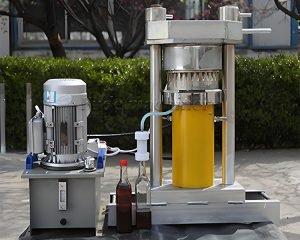
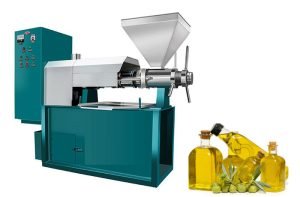
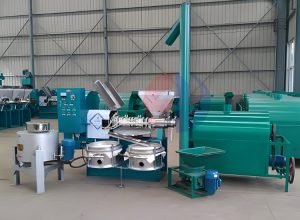

HelloPlease log in